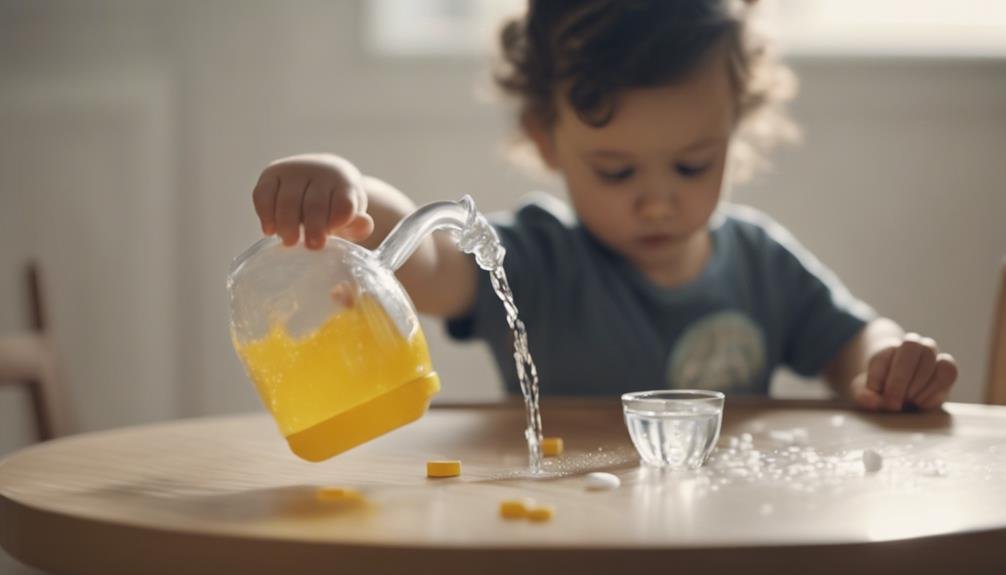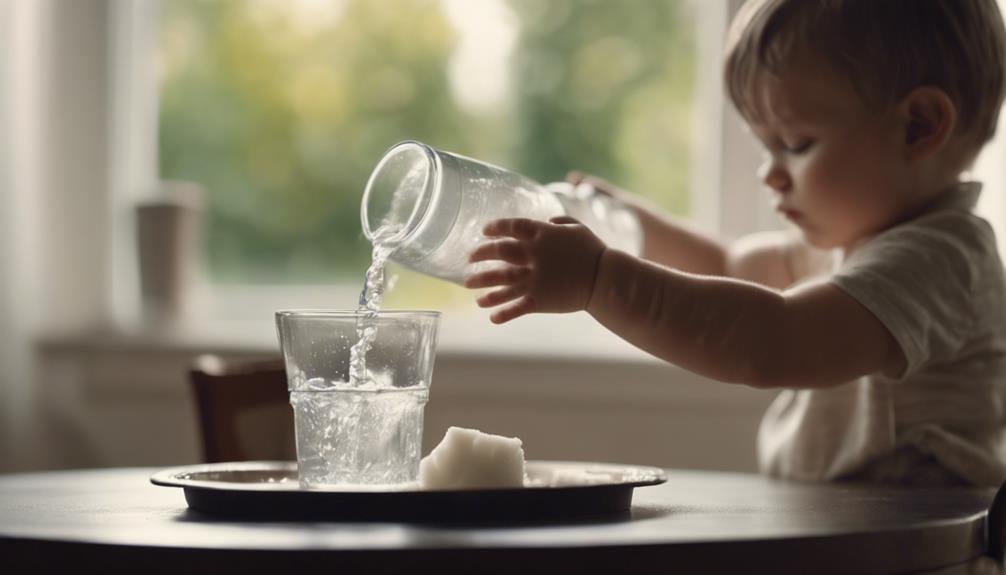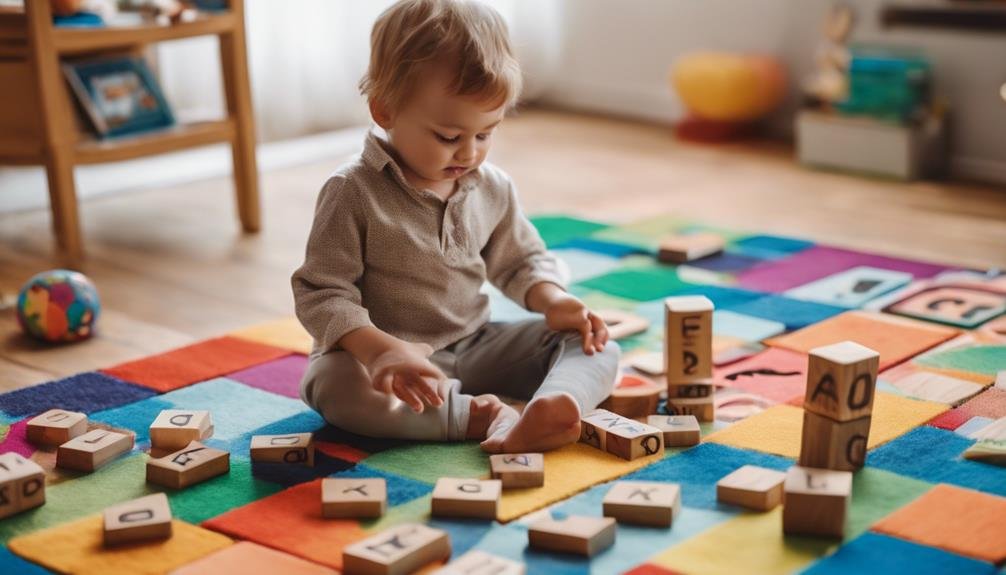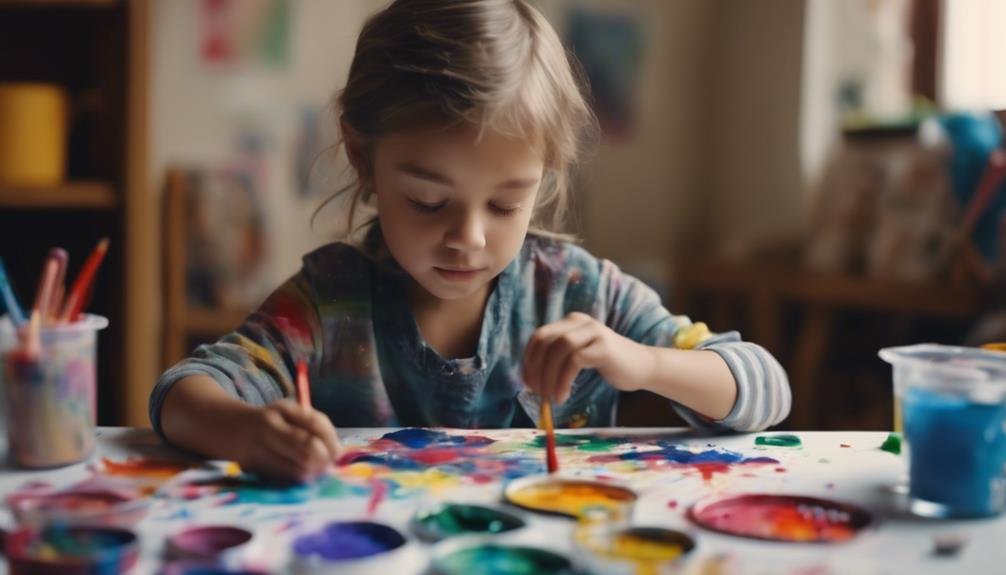"Cherishing Little Steps - A Haven for Baby and Family Journeys"
Montessori at Home: Toddler Activities for Early Learning
Embracing Montessori principles at home for toddler activities can provide a nurturing environment that supports early learning and growth. By implementing child-centered elements in your living space, such as low shelves and natural materials, you can foster independence and creativity in your child. But have you ever wondered how these activities can benefit your toddler beyond just playtime?
Key Takeaways
- Set up a Montessori environment at home for independence and hands-on learning experiences.
- Engage toddlers in practical life activities to develop essential skills and independence.
- Introduce sensorial activities to refine sensory perception and cognitive skills through fun exploration.
- Foster language development through interactive play, reading, and positive reinforcement.
- Encourage math exploration with daily activities to build foundational counting skills and curiosity.
Benefits of Montessori Education

Discover why choosing Montessori education can significantly impact your child's early development and learning journey. Montessori education emphasizes independence, self-directed learning, and hands-on experiences tailored to each child's unique pace and interests. By allowing children the freedom to explore and learn at their own rhythm, Montessori fosters a love for learning that can last a lifetime.
The child-centered approach in Montessori classrooms encourages problem-solving skills, critical thinking, and creativity from a young age, setting a strong foundation for future academic success.
In a Montessori environment, children are encouraged to engage in purposeful work that develops their concentration, coordination, and cognitive abilities. The mixed-age classrooms promote social skills, empathy, and collaboration, helping children learn from one another and develop respect for diverse perspectives.
Through the use of specially designed materials and activities, Montessori education nurtures a child's natural curiosity and desire to explore the world around them, creating a stimulating and enriching learning environment that supports holistic development.
Setting Up a Montessori Environment
Now, let's set the stage for creating a Montessori environment that nurtures your child's curiosity and independence. Creating a Montessori environment at home is about fostering a space that encourages exploration, independence, and learning through hands-on experiences.
Start by organizing your child's play area with low, open shelves to display toys and materials where they're easily accessible. Consider incorporating natural materials like wood, glass, and fabric to connect your child with the environment. Provide child-sized furniture to promote independence in daily activities like dressing and mealtime.
Include a cozy reading nook with a variety of books that cover different topics and cultures to spark your child's interest in learning. Utilize soft, warm lighting to create a calming atmosphere that encourages focus and concentration. Keep the space clutter-free to allow for movement and exploration.
Practical Life Activities for Toddlers

To help your toddler develop essential life skills and independence, engage them in practical activities that are both educational and enjoyable. Practical life activities are a cornerstone of the Montessori method, focusing on tasks that help children care for themselves and their environment. Simple activities like pouring water from one container to another, spooning rice, or sweeping the floor not only enhance fine motor skills but also instill a sense of responsibility and accomplishment in your little one.
These activities may seem basic, but they play a crucial role in your toddler's development. By participating in these tasks, children learn concentration, coordination, and independence. For example, setting the table for a snack teaches orderliness and sequence, while watering plants encourages care and nurturance. As your toddler engages in these activities, they aren't just playing; they're actively learning skills that will benefit them throughout their lives.
Sensorial Activities to Stimulate Senses
Engage your toddler's senses with hands-on sensorial activities that promote exploration and learning. Here are three simple yet effective ways to stimulate your little one's senses:
- Sensory Bins: Fill a container with items like rice, beans, or sand for your toddler to explore through touch. Add scoops, cups, and small toys to enhance the sensory experience.
- Scent Jars: Create scent jars by filling small containers with items like coffee beans, lavender, or citrus peels. Encourage your child to smell each jar and describe the scents.
- Texture Boards: Make texture boards using materials with different textures such as fur, sandpaper, and silk fabric. Let your toddler touch and feel each texture to develop their tactile sense.
These sensorial activities not only engage your toddler's senses but also help them refine their sensory perception, language development, and cognitive skills in a fun and interactive way.
Language Development Through Play

Enhance your toddler's language skills through interactive play activities that encourage communication and vocabulary development. Engaging in activities like storytelling, puppet shows, and role-playing can greatly benefit your child's language development. Encourage your toddler to express themselves through words, gestures, and facial expressions during playtime. Use simple and clear language to describe objects, actions, and feelings to help expand their vocabulary.
Reading books together is an excellent way to introduce new words and concepts to your toddler. Choose books with colorful pictures and simple sentences to keep them engaged. Ask open-ended questions about the story to encourage conversation and critical thinking skills. Singing songs and nursery rhymes can also enhance your toddler's language skills by introducing rhythm and repetition.
Additionally, playing games like 'I Spy' or naming objects around the house can help your toddler practice their vocabulary. Remember to praise their efforts and provide positive reinforcement to boost their confidence. By incorporating these language development activities into your toddler's playtime, you can create a fun and enriching environment for them to learn and grow.
Math Exploration and Concepts
Discover the fascinating world of numbers and shapes with your toddler through hands-on math exploration activities. Engaging your little one in early math concepts can be both fun and educational. Here are some activities to help your toddler develop a love for math:
- Number Hunt: Hide number cards around the house or yard and encourage your toddler to find them. As they find each number, say it out loud together.
- Shape Sorting: Use everyday objects like blocks or toys to introduce basic shapes. Have your toddler sort them into different groups based on shape.
- Counting Fun: Count everyday items like toys, snacks, or steps as you go about your day. This simple activity helps build foundational counting skills.
These activities not only enhance your toddler's understanding of math but also foster a sense of curiosity and discovery. Make math a part of your daily routine, and watch your toddler's mathematical skills grow!
Art and Creativity for Young Minds

Get ready to unleash your toddler's creativity with simple and enjoyable art activities that will spark their imagination and artistic expression. Engaging in art at a young age can help your child develop fine motor skills, creativity, and self-expression.
One fun activity is finger painting. Set up a safe space, provide non-toxic paint, and watch as your toddler explores mixing colors and creating masterpieces with their fingers.
Another great idea is creating a sensory collage. Gather items with different textures like feathers, cotton balls, or sandpaper, and let your toddler glue them onto a piece of paper, engaging their senses while they create.
Encourage your little one to experiment with different art supplies like crayons, markers, and playdough to further enhance their artistic exploration. Display their artwork proudly to boost their confidence and show them that their creativity is valued.
With these simple art activities, you can nurture your toddler's imagination and artistic talents while having a blast together.
Outdoor Exploration and Nature Activities
Step outside with your toddler and embark on a journey of outdoor exploration and nature activities to ignite their curiosity and connection with the natural world.
- Nature Scavenger Hunt: Create a list of items like pinecones, flowers, or different colored leaves for your little one to find in the yard or park. This activity encourages observation skills and appreciation for nature's beauty.
- Sensory Nature Bins: Fill bins with materials like sand, rocks, or water for your toddler to explore using their senses. This hands-on experience with different textures and elements fosters sensory development.
- Outdoor Art: Take art supplies outdoors and let your toddler create masterpieces using leaves, flowers, or mud as their canvas. This activity promotes creativity and an understanding of natural materials.
Engaging in these outdoor activities not only enhances your toddler's learning but also nurtures a love for the environment. Enjoy the fresh air, bond with your little one, and watch them grow through exploration of the natural world.
Frequently Asked Questions
How Can Montessori Principles Be Adapted for Different Learning Styles?
To adapt Montessori principles for different learning styles, observe your child closely. Offer varied materials, activities, and approaches. Encourage independence and exploration. Flexibility is key. Tailor the environment and teaching methods to suit your child's unique way of learning.
Are There Specific Guidelines for Incorporating Technology in Montessori Activities?
When incorporating technology into Montessori activities, remember to keep it purposeful and limited. Choose interactive apps or educational videos that align with Montessori principles. Monitor screen time and ensure it complements hands-on learning experiences.
What Are Some Tips for Managing Challenging Behaviors in a Montessori Setting?
When managing challenging behaviors in a Montessori setting, remember to stay calm, validate feelings, and set clear boundaries. Encourage independence, offer choices, and provide engaging activities. Consistent, positive reinforcement helps create a supportive environment for learning and growth.
Can Montessori Activities Be Combined With Traditional Curriculum Approaches?
You can definitely combine Montessori activities with traditional curriculum approaches. By blending both methods, you can provide a well-rounded educational experience for your child, incorporating the best of both worlds to cater to their learning needs effectively.
How Can Parents Track and Measure Their Toddler's Progress With Montessori Activities?
To track your toddler's progress with Montessori activities, create a simple journal. Jot down observations and milestones. Celebrate each step forward! By keeping notes regularly, you'll see growth over time and better understand your child's development.
Conclusion
In conclusion, bringing Montessori principles into your home for toddler activities can lay a strong foundation for early learning and development. Remember, 'the roots of education are bitter, but the fruit is sweet.'
By creating a nurturing environment with child-centered elements and engaging in practical life activities, sensorial experiences, language development, math exploration, art projects, and outdoor adventures, you're providing your little one with the tools they need to thrive and grow.
Embrace the journey and enjoy watching your toddler blossom!




